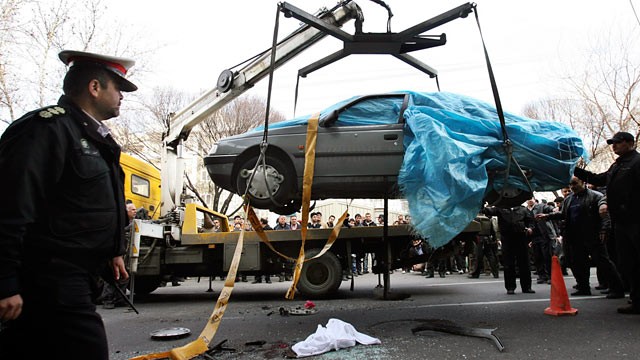US Denies Role in Iranian Nuclear Scientist's Assassination
"I want to categorically deny any United States involvement in any kind of act of violence inside Iran," Clinton told reporters today. "We believe that there has to be an understanding between Iran, its neighbors and the international community that finds a way forward for [Iran] to end its provocative behavior, end its search for nuclear weapons and rejoin the international community and be a productive member of it."
Mostafa Ahmadi Roshan, 32, was killed today after a magnetic explosive device was slipped under his car by a motorcyclist and then detonated, according to Iranian news reports. It's a tactic one Iranian semi-official outlet, Fars News, noted was similar to the failed assassination of university professor Fereidoun Abbassi Davani in 2010. Davani is now the head of Iran's Atomic Energy Organization. Another nuclear scientist, Massoud Ali Mohammadi, was killed almost exactly two years ago by a remote-controlled bomb attached to his car.
Roshan is the fourth scientist linked to Iran's nuclear program killed in the past two years. He was a chemistry engineer, serving as professor at a Tehran university as well as a deputy director of the Natanz uranium enrichment facility, Fars News reported. Roshan's driver was wounded in the blast and later died.
Hours after the attack, Iranian officials accused the U.S. and Israel of being behind the assassination, the latest in a string of incidents apparently aimed at disrupting Iran's nuclear program that Israeli and western intelligence agencies are suspected of spearheading.
"America and Israel's heinous act will not change the course of the Iranian nation," the Iran's Atomic Energy Organization said in a statement, referring to the bombing.
AP
Two assailants on a motorcycle attached... View Full Size
Iranian Nuclear Scientist Allegedly Assassinated
U.S. Coast Guard Rescues Iranian Sailors Watch Video
"The terrorist action was carried out by the hirelings of the Zionist [Israeli] regime and those who claim to be fighting terrorism," Iranian First Vice President Mohammed Reza Rahimi told a cabinet meeting on Wednesday.
After Iranian officials leveled their accusations, a spokesperson for the Israel Defense Forces, Brig. Gen. Yoav Mordechai, wrote on Facebook, "I don't know who settled a score with the Iranian scientist, but I am certainly not shedding a tear."
The attack comes a day after the head of Israel's military told parliament that 2012 "will be a critical year in the connection between Iran gaining nuclear power, changes in leadership, continuing pressure from the international community and events that happen unnaturally."
It follows other similarly cagey comments from top Israeli officials in recent months as well as comments from former officials who say foreign intelligence agencies are responsible for the deadly attacks.
"There are countries who impose economic sanctions and there are countries who act in other ways," Israel's Minister of Intelligence and Atomic Energy Dan Meridor said late last year.
Israeli analyst Yoel Guzansky, who was in charge of the Iran desk at Israel's National Security Council and now works for the Institute for National Security Studies in Tel Aviv, said he believes it is part of an international plot though was likely executed by recruited Iranian operatives on the ground.
"Covert activity may weaken Iran's determination, exact a high price from it, and signal that it better moderate its positions," Guzansky said in an email to ABC News. "This course of action increases the pressure on Iran in comparison with the sanctions approved so far, while avoiding the price that a military attack on the nuclear facilities may incur…
"Beyond the delay in the program, causing direct failures by an 'invisible hand' has a psychological effect, contribute significantly to Iranian 'paranoia'," he added. "It sends a message to Iran that its plan is breached and accessible."
Iran has long maintained its nuclear program is for peaceful purposes only.
American officials have repeatedly denied any involvement in the killing of scientists.
http://abcnews.go.com/Blotter/iranian-nuclear-scientist-killed-amid-heightened-tensions/story?id=15338086#.Tw8jlYGWRrI


No comments:
Post a Comment